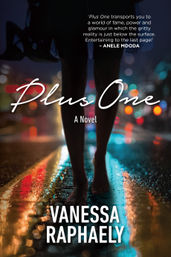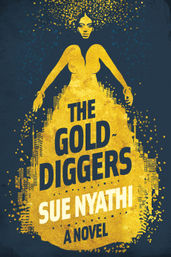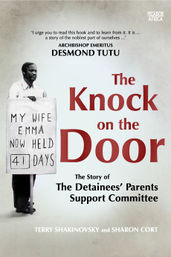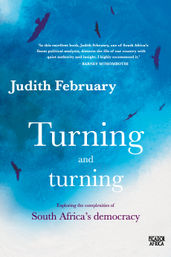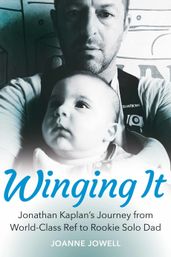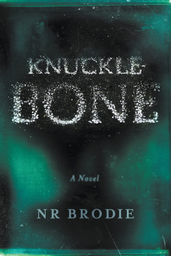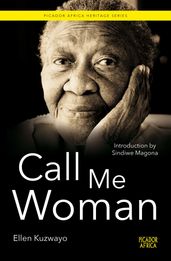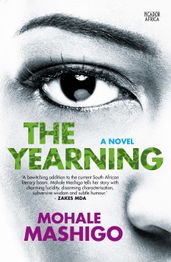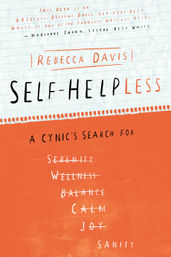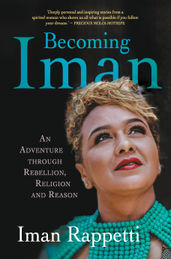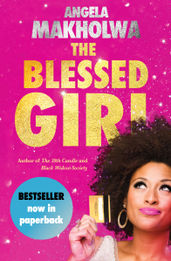Celebrating our local female authors
To mark International Women’s Day on 8 March, we celebrate some of our incredible local female writers.

“Every word a woman writes changes the story of the world, revises the official version.” - Carolyn See
International Women's Day is celebrated every year on 8 March across the globe. The day is an important point in the movement for women’s rights, to celebrate and recognises their achievements. Furthermore, it brings attention to challenges which still affect women, including access to education, inequality and gender-based discrimination.
What better way to mark the day by honouring some of our favourite female writers, for their immense contribution and powerful stories?
Here are books written by local female authors you should be reading:
An Elephant in My Kitchen
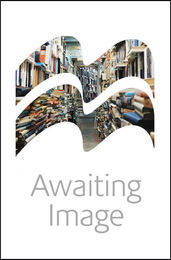
The Accident
by Gail Schimmel
Twenty-six years is a long time not to be alive.
Since The Accident that ruined her life, Catherine has lived on autopilot, going through the motions of work and motherhood without being fully present. Trying to fill the gap, her adult daughter, Julia, is looking for love in all the wrong places, and wreaking havoc on the lives that she touches along the way.
Just what will it take to shock Catherine back into life?
Plus One
by Vanessa Raphaely
As deputy editor of the glamorous FILLE magazine in London, Lisa Lassiter had almost passed up the chance of a weekend on a billionaire’s yacht off the coast of Mykonos. But her best friend Claudia Hemmingway, on her way to becoming one of the hottest movie stars on the planet, could be very persuasive when she wanted something. Not only would they get there by private jet, she’d told Lisa, they would also get to rub shoulders with VIP guests – not least a famous Hollywood film producer. It would be a weekend of fun, sunshine, champagne and partying.
And it was all of those things. Until it wasn’t.
Lisa has spent ten years trying to get past that weekend. If she has learnt anything, it is that unfinished business and secrets always work their way to the surface. Moving on is one thing; forgetting is another, and forgiving … well, where to start?
Live Lead Learn
by Gail Kelly
Gail Kelly’s presence reaches far beyond her own profession. The first female CEO of one of Australia’s big four banks, listed by Forbes in 2010 as the eighth most powerful woman in the world, and mother of four (including triplets), Gail is celebrated as one of the finest, most innovative thinkers on leadership and workplace culture. In these personal, practical chapters, Gail shares what she has learned over her remarkable career, drawing from her personal and professional life.
As a leader, she argues passionately for the importance of putting people and customers at the heart of a business; of leading with courage and generosity of spirit; and of resilience. Some of these lessons were learned at times of high pressure, and Gail takes us into her thinking as she led Westpac through the global financial crisis and the merger with St.George.
But Gail’s voice speaks to each of us, whatever our role in life. She explores the absolute importance of loving what you do; learning to learn; backing yourself; and, most importantly, placing your family above all things.
At the heart of Gail’s refreshing, authentic, integrated approach is how both individuals and companies thrive when they openly address the meaning of what they do, and understand the need to live a whole life.
Live Lead Learn is the inspiring story of one of the world’s most prominent businesspeople. It is also the story of a Pretoria girl who started out as a Latin teacher before making a shift to banking. Her executive career in the financial services industry spanned 35 years, equally split between the two countries she loves – South Africa and Australia. Her first role was as a teller at the Simmonds Street branch of the SA Perm in Johannesburg. Her last role was that of CEO of Westpac in Australia. Gail describes her journey as an improbable one. It is certainly a fascinating one.
The GoldDiggers
by Sue Nyathi
It’s 2008 and the height of Zimbabwe’s economic demise. A group of passengers is huddled in a Toyota Quantum about to embark on a treacherous expedition to the City of Gold. Amongst them is Gugulethu, who is hoping to be reconciled with her mother; Dumisani, an ambitious young man who believes he will strike it rich, Chamunorwa and Chenai, twins running from their troubled past; and Portia and Nkosi, a mother and son desperate to be reunited with a husband and father they see once a year.
They have paid a high price for the dangerous passage to what they believe is a better life; an escape from the vicious vagaries of their present life in Bulawayo. In their minds, the streets of Johannesburg are paved with gold but they will have to dig deep to get close to any gold, dirtying themselves in the process.
Told with brave honesty and bold description, the stories of the individual immigrants are simultaneously heart-breaking and heart-warming.
Rule of Law
by Glynnis Breytenbach
Over a legal career spanning 26 years, advocate Glynnis Breytenbach earned a reputation as one of the country’s most formidable state prosecutors, her infamous stare piercing the defences of many. Now a member of parliament and the Democratic Alliance’s shadow minister for justice, Glynnis finally shares how her life in and out of court shaped her into the outspoken, sometimes hard-headed, always principled woman she is, and the public figure she never wanted to be.
In Rule of Law, Glynnis provides personal commentary on the evolution and importance of an independent judiciary in South Africa, and explains why the rule of law is critical to the foundation and the future of the country. Her account offers fascinating insights, a critical analysis of some of South Africa’s recent legal and political cliffhangers, and a suggestion as to how the law can help us find a way forward as a country.
The Knock on the Door
by Terry Shakinovsky
The Detainees’ Parents Support Committee (DPSC) was started in 1981 in Johannesburg, South Africa. It was set up by the parents, spouses and families of activists who were detained and had no recourse to legal intervention. Many in this movement had not been politically involved.
Members of the DPSC stood on street corners with placards calling for the release of their children. They organised food, clothing and legal representation for detainees across the country, and they supported the detainees’ families. DPSC activists marched, petitioned, argued, wrote and protested for the release of all detainees. They made public the brutal operations of the security establishment.
The DPSC helped to draw international attention to the atrocities being perpetuated against children – some as young as nine – by the apartheid state. And the evidence amassed by the DPSC helped to lay some of the groundwork for South Africa’s Truth and Reconciliation Commission (TRC).
The Knock on the Door tells the story of the DPSC and of how the anti-detention movement became part of the mass uprising that brought down apartheid. It is an inspiring account of ordinary people coming together to stand up against racism and the abuse of power.
Turning and Turning
by Judith February
South Africans often are deeply polarised in our perspectives of the present and the past. Our ‘ways of seeing’ are fraught with division, and we fail to understand the complexities when we do not see what lies beneath the surface.
There is no denying that the Jacob Zuma presidency took a significant toll on South Africa, exacerbating tensions and exposing the deep fractures that already exist in our society along the lines of race, class and even ethnicity. The Zuma years were marked by cases of corruption and state capture, unprecedented in their brazenness, and increased social protests – many of which were accompanied by violence – aggressive public discourse, lack of respect for reason and an often disturbing resistance to meaningful engagement.
Importantly, those years also placed enormous pressure on our democratic institutions, many of which still bear the scars, and challenged the sovereignty of the Constitution itself. As an analyst and governance specialist at the Institute for Democracy in South Africa (IDASA) for twelve years, February has had a unique perch. Turning and turning is a snapshot of her IDASA years and the issues tackled, which included work on the arms deal and its corrosive impact on democratic institutions, IDASA’s party-funding campaign, which February helped lead, as well as work on accountability and transparency.
Combining analytical insight with personal observations and experience, February highlights the complex process of building a strong democratic society, and the difficulties of living in a constitutional democracy marked by soaring levels of inequality. There is a need to reflect on and learn from the country’s democratic journey if citizens are to shape our democracy effectively and to fulfill the promise of the Constitution for all South Africans.
Winging It
by Joanne Jowell
Jonathan Kaplan, celebrated international rugby referee and former world record-holder for most Test caps, had his fair share of challenging moments on the field. He was known for his commitment to fair play, ability to defuse tense situations, and courage in making difficult, and sometimes controversial, decisions. All this would stand JK in good stead and come back into play when, at the age of 47, he made two life-changing decisions. The first was to blow his whistle for the last time and end his career as a professional rugby ref. The second was to become a parent – and a solo parent at that.
This is the story of JK’s decision to have a baby by surrogate, the two-year fertility process that followed, and the subsequent birth of his son Kaleb.Winging It draws on the insights of key role-players in JK’s journey, including the extraordinary experience of the surrogate mother herself. Exchanging rucks for reflux, mauls for milk bottles, scrums for storks (and other stories about Kaleb’s conception), this account of how JK navigates the choppy waters of parenthood is disarmingly frank and scrupulously honest. At times poignant and tender, and at others downright funny, this is a thoroughly contemporary take on what constitutes a family and how we dare to build one.
Knucklebone
by N.R. Brodie
Call Me Woman
by Ellen Kuzwayo
Like millions of black South Africans made strangers in the land of their birth, Ellen Kuzwayo lost a great deal in her lifetime: the farm in the Orange Free State that had belonged to her family for nearly a hundred years; her hopes for a full and peaceful life for her children; and even her freedom, when, at the age of 63, she found herself detained under the so-called Terrorism Act for an offence never specified. But she never lost her courage.
This remarkable autobiography refuses to focus only on the author, for it draws on the unrecorded history of a whole people. In telling her own personal and political story over 70 years. Ellen Kuzwayo speaks for, and with, the women among whom she worked and lived. Their courage and dignity remain a source of wonder and inspiration.
Beauty's Gift
by Ellen Kuzwayo
Like millions of black South Africans made strangers in the land of their birth, Ellen Kuzwayo lost a great deal in her lifetime: the farm in the Orange Free State that had belonged to her family for nearly a hundred years; her hopes for a full and peaceful life for her children; and even her freedom, when, at the age of 63, she found herself detained under the so-called Terrorism Act for an offence never specified. But she never lost her courage.
This remarkable autobiography refuses to focus only on the author, for it draws on the unrecorded history of a whole people. In telling her own personal and political story over 70 years. Ellen Kuzwayo speaks for, and with, the women among whom she worked and lived. Their courage and dignity remain a source of wonder and inspiration.
The Yearning
by Mohale Mashigo
How long does it take for scars to heal? How long does it take for a scarred memory to fester and rise to the surface? For Marubini, the question is whether scars ever heal when you forget they are there to begin with.
Marubini is a young woman who has an enviable life in Cape Town, working at a wine farm and spending idyllic days with her friends ... until her past starts spilling into her present.
Something dark has been lurking in the shadows of Marubini’s life from as far back as she can remember. It’s only a matter of time before it reaches out and grabs at her.
The Yearning is a memorable exploration of the ripple effects of the past, of personal strength and courage, and of the shadowy intersections of traditional and modern worlds.
Self-helpless
by Rebecca Davis
Everywhere Rebecca Davis looked, the world was in poor shape. And because she’d quit drinking, she no longer had the comfort blanket of alcohol to tamp down her anxiety. How did sober people stay sane?
In recent times, the self-help industry has exploded into a multi-billion dollar global industry – and along with it has come every imaginable type of therapy, healing or general woo-woo. In the past, Rebecca scoffed at this industry, mocking its reliance on half-baked science and the way it appears to prey on the mentally fragile.
But as she searched for a meaning of life that did not involve booze, she found it increasingly hard to rationalize her default scepticism. This shit really seems to work for some people, she reasoned. And it’s not like I have any particularly solid alternatives.
Rebecca lives in Cape Town, the undisputed epicentre of ‘alternative’ paths to peace and enlightenment in South Africa. She decided that over the course of a year, she would embark on a quest for personal wellness, spiritual enlightenment and good old-fashioned happiness. She was willing, within reason, to try anything. She would open herself to even the most outlandish contemporary fads in self-improvement.
What followed was a twelve-month immersion in the world of auras, chakras, hallucinogenic drugs, sweat lodges, sangomas, past lives and more.
And by the end of it? Maybe she would find some new ways of thinking and living. Or maybe she would emerge with her prejudices untouched. Either way, it would be a good story.
Becoming Iman
by Iman Rappetti
Iman Rappetti is an award-winning journalist who has been involved in print, radio and television. She worked as a young journalist in South Africa and then abandoned it (along with all her worldly possessions) when she became Muslim.
She lived in the Islamic Republic of Iran for two years, where she also worked on a current affairs TV show for the state broadcaster before returning to South Africa and resuming her life here. She describes herself as ‘the youngest of five children. One Rasatafarian brother (passed away), one ex-con brother (who can dance the pants off any woman and has a wicked sense of humour), another brother who’s a big shot in the marine engineering industry (he makes a mean curry), and a sister who has the thankless task of staying at home and raising the rugrats (she has a way with words, and also makes a kick-ass briyani)’. In this moving and entertaining memoir, Iman shares stories and what she has learned from her colourful journey through life.
The Blessed Girl
by Angela Makholwa
When you are accustomed to the finer things in life – designer shoes, champagne, VIP lounges, exotic holidays abroad, a luxury penthouse, expensive wheels – what independent young woman in her right mind would want to let them go?
Certainly not the beautiful, ambitious and super-streetsmart Bontle Tau, the girl who has used her good looks and winning charm all her life to get exactly what she wants. The lifestyle doesn’t come cheap, though, nor does maintaining the body that allows it (just ask Dr Heinz at the beauty clinic). Luckily, Bontle has a degree in MENcology, and there is no shortage of blessers at her penthouse door, eager to give her all the love and (financial) support she needs. Papa Jeff might be overweight and getting on a bit, and receiving some unwanted attention from the Hawks; and Teddy might not have fully come through for her on that messed-up tender business; but Mr Emmanuel, the Nigerian businessman with deep pockets and the possibility of conferring second wife status … could that be love?
Keeping all her boyfriends happy and living a fabulous life is not without its challenges. With so many people clamouring for Bontle’s attention – from her shebeen queen mother Gladys in Mamelodi, who is taking strain bringing up her teenaged brother, Golokile, on her own; to her girlfriends, Iris and Tsholo; not to mention her soon-to-be ex-husband, the ever-patient, ever-loving Ntokozo, Bontle barely has time to post on Instagram these days. Sooner or later something’s got to give …

